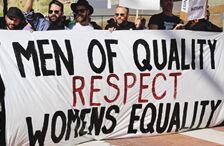联合国性别研究报告:90%的人对女性有歧视
|
实现男女平等的那一天还有多远呢?联合国的调查发现,世界上没有哪个国家真正实现了男女平等,而且性别歧视在一些国家仍然非常严重,全球包括女性在内的大多数人都对女性持有偏见。 A new UN report has found at least 90% of men and women hold some sort of bias against females. 联合国的一份新报告发现,至少90%的人对女性持有某种偏见。 The "Gender Social Norms" index analysed biases in areas such as politics and education in 75 countries. “性别社会标准”指数分析了75个国家在政治、教育等方面的性别偏见。
Globally, close to 50% of men said they had more right to a job than women. Almost a third of respondents thought it was acceptable for men to hit their partners. 从全球来看,近50%的男性表示他们比女性更有权利获得工作。近三分之一的受访者认为,男性打配偶是可以接受的。 There are no countries in the world with gender equality, the study found. 研究发现,世界上没有性别平等的国家。 Zimbabwe had the highest amount of bias with only 0.27% of people reporting no gender bias at all. At the other end of the scale was Andorra where 72% of people reported no bias. 津巴布韦的性别歧视最严重,只有0.27%的人没有报告性别歧视现象。性别最平等的则是安道尔共和国,有72%的人报告称不存在性别歧视。 In Zimbabwe, 96% of people said violence against women was acceptable and the same proportion did not support reproductive rights. In the Philippines, 91% of people held these views. 在津巴布韦,96%的人表示对女性实施暴力是可以接受的,还有同样多的人不支持生育权。在菲律宾,91%的人持有这些观点。 Women in political roles According to the report, about half of the world's men and women feel that men make better political leaders. 这份报告指出,全球约半数的男性和女性认为,男性能成为更好的政治领袖。 In China, 55% of people thought men were better suited to be political leaders. 在中国,55%的人认为男性更适合当政治领袖。 Around 39% of people in the US, which is yet to have a female president, thought men made better leaders. 在从未有过女总统的美国,约39%的人认为男性更适合当领导人。 However in New Zealand, a country that currently has a female leader, only 27% of people thought that. 然而,在由女性担任国家首脑的新西兰,只有27%的人这么认为。 The number of female heads of government is lower today than five years ago with only 10 women in such positions in 193 countries, down from 15 in 2014. 如今,担任政府首脑的女性数量相比五年前下降了,193个国家中只有10位女性担任政府首脑,相比2014年的15位有所下降。 However when it comes to seats in parliament, there is a slightly higher percentage of women in these roles. 不过,进入议会的女性数量稍有增加。 Latin America and the Caribbean had the highest share of seats in parliament held by women with 31%. South Asian countries had the lowest percentage at just 17%. 拉丁美洲和加勒比地区的女性占据议会席位的比例最高,达到31%。南亚国家女性入议会的比例最低,只有17%。 Pedro Conceição, head of UNDP's Human Development Report Office said: "We have come a long way in recent decades to ensure that women have the same access to life's basic needs as men. But gender gaps are still all too obvious in other areas." 联合国开发计划署人类发展报告办公室主任佩德罗·孔塞桑说:“最近几十年来,为了确保女性能够和男性一样获得基本生活需求的权利,我们已经付出了很多努力。但是其他领域的性别差距仍然很明显。” Women in the labour market Women are paid less than men and are much less likely to be in senior positions. Globally, 40% of people thought men made better business executives. 女性的薪酬低于男性,而且身居高位的可能性比男性低得多。全球范围内,40%的人认为男性做企业高管更出色。 In the UK, 25% of people thought men should have more right to a job than women and said men made better business executives than women did. In India that figure was 69%. 在英国,25%的人认为男性比女性更有权利获得工作,而且表示男性做企业高管比女性做得更好。在印度这一比例是69%。 Raquel Lagunas, UNDP gender team acting director said: "We must act now to break through the barrier of bias and prejudices if we want to see progress at the speed and scale needed to achieve gender equality." 联合国开发计划署的性别团队代理主任拉克尔·拉古纳说:“如果我们想要加速推进以达到性别平等,我们就必须现在采取措施来打破歧视和偏见的障碍。” |









